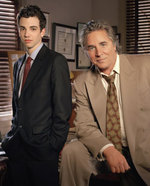I couldn’t help but notice the significant production differences between the THRESHOLD pilot and their first, regular episode.
The pilot was filled with special effects, action, and multiple interior and exterior locations. The first regular episode was considerably downsized. There were only two real locations — the "standing sets" (the sets/locations used every week) and a military academy (USC? UCLA?). Of the six member cast, four were stuck on the standing sets delivering exposition while two others were on location doing most of the "action," which was limited to running up and down hallways (one cast member otherwise relegated to standing sets was seen in a restroom that was supposedly at a fast-food place. The restroom was clearly a swingset built on the soundstage or a practical location found at the military acadamy which, I suspect, was also where they dressed as space to be the fast food place).
There were no special effects and virtually no exteriors, save a couple of walk-and-talks and one scene in a parked car, which was shot so tight, with so many other parked cars in view, that I suspect it was shot outside the soundstage.
I enjoyed the episode, but it was a lesson in the budgetary restraints that always come into play once the pilot, full of bells-and-whistles, is sold as a series. I’m sure there will be some effects-heavy/location-heavy episodes down the road (particularly during "Sweeps"), but to pay for them/amortize them, more often than not each week you will see a clear balance between "standing set" scenes with the bulk of the cast members and one or possibly two other locations with the rest of the regulars.
I don’t think the average viewer registers the differences but, as a producer/showrunner, I always find it fascinating and instructive. Why do you think the castaways on LOST moved from the beach into a cave? To give them a standing, interior set. Usually, just by watching a handful of episodes, I can get a pretty good sense of how many days they shoot, they budgeted ratio of days on stage/on location, the number of locations they can afford, and what their casting budget is like (in terms of number of guest cast in speaking roles as opposed to how much they have to spend on individual name actors). Watching television is often the best way to learn about television.
 The triggermen at the networks have very itchy fingers. The WB killed Jerry Bruckheimer’s JUST LEGAL, starring Don Johnson, after a mere three episodes and NBC aborted INCONCEIVABLE, starring Angie Harmon, after only two airings.
The triggermen at the networks have very itchy fingers. The WB killed Jerry Bruckheimer’s JUST LEGAL, starring Don Johnson, after a mere three episodes and NBC aborted INCONCEIVABLE, starring Angie Harmon, after only two airings. 

